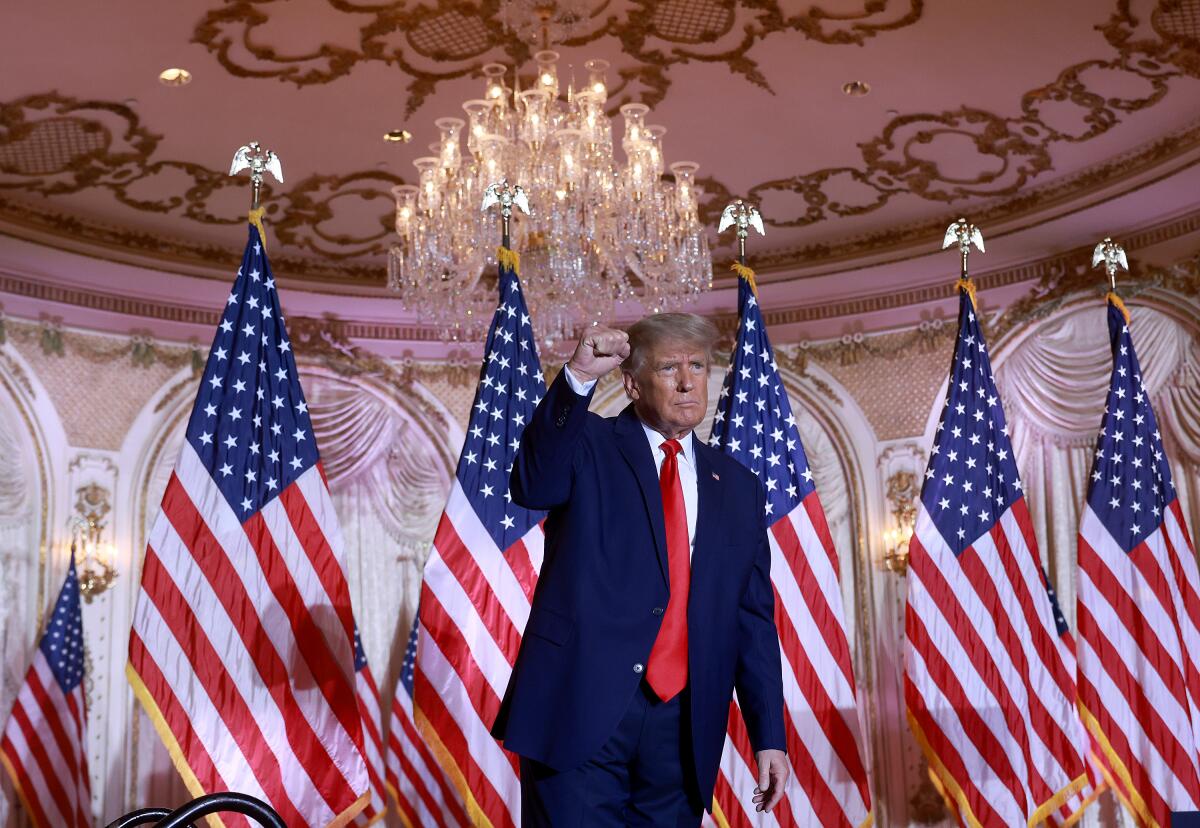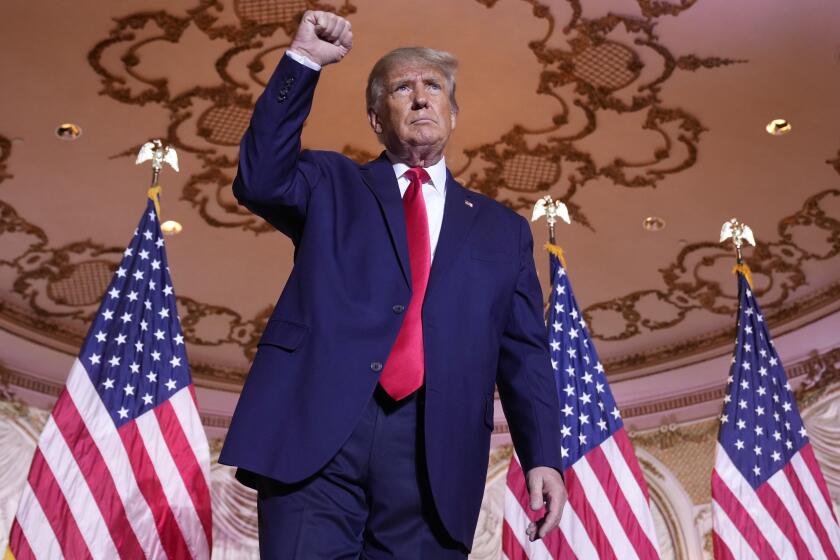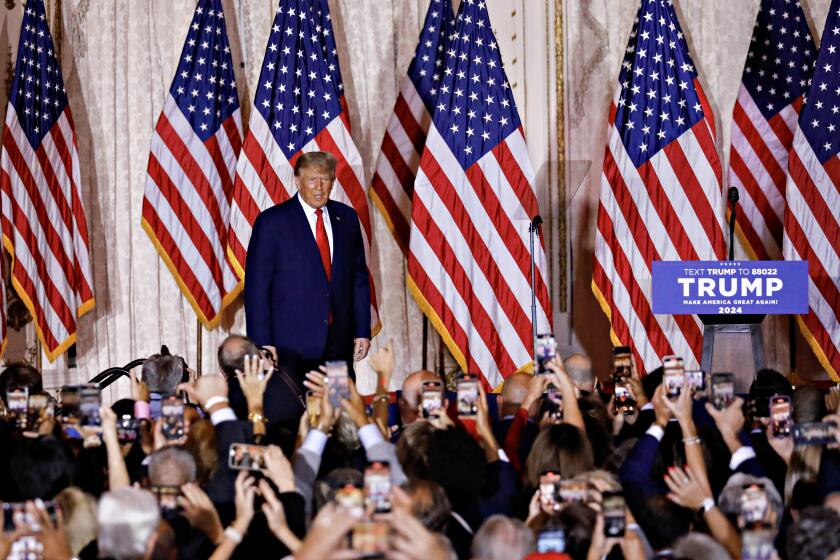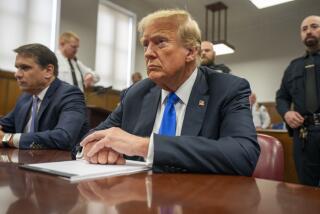Column: Trump’s candidacy complicates a potential criminal case against him, but it can’t protect him

The consensus in the wake of Donald Trump’s announcement that he is running for president in 2024 is that he is hoping to avert, or at least gum up, a decision to file criminal charges against him by the Department of Justice and the Fulton County district attorney in Georgia.
If that’s Trump’s hope, it rests, like so much of his governance, on ignorance and overconfidence. His announced candidacy erects no major roadblock to prosecution by the Justice Department or by Atlanta Dist. Atty. Fani Willis.
But it does introduce a fly in the ointment for the feds. Ultimately, however, it shouldn’t make the Department of Justice stay or delay its decision, and it has no bearing at all on the Fulton County decision.
First, to the broader proposition of whether presidential candidacy in itself offers protection from prosecution: There is nothing in Justice Department regulations, prosecutorial policy or common sense supporting a ban on indicting presidential candidates.
Candidates are private citizens. If anything, the prospect that a guilty defendant will abuse the public interest after election is a reason pointing toward pursuing an investigation.
In announcing his candidacy Tuesday night, former President Trump has reverted to a familiar tactic at a time of weakness: hubris and volume.
The Justice Department does have a policy against non-interference during elections, but it covers only overt actions taken by federal prosecutors in the weeks just before election day. That can have no possible bearing on Trump’s situation now — the 2024 election is almost two years away.
But the department also has rules related to conflicts of interest, and these at least pose a complication for prosecuting a declared presidential candidate.
DOJ regulations provide that the attorney general “will appoint a special counsel” when 1) criminal investigation of a person is warranted ; 2) the investigation would present a conflict of interest or other extraordinary circumstances; and 3) it would be in the public interest for a special counsel to take the reins.
The first two criteria are met in Trump’s case.
His actions related to Jan. 6 and the attempt to undo the 2020 election results, along with his obdurate possession of government documents at Mar-a-Lago, clearly warrant investigation.
That the Trump candidacy presents a conflict is almost as blunt and patent: A successful prosecution of Trump now would directly advance President Biden’s reelection interests, and Biden as head of the executive branch is also the head of the Justice Department. (That’s in fact the dynamic that led to Trump’s first impeachment — a scheme to tarnish Biden to advance Trump’s 2020 reelection prospects.) Also, indirectly but materially, prosecuting Trump could advance Garland’s interests in his job.
Amid signs Trump is losing his grip on the Republican Party, a familiar appeal to grievance. Will his GOP rivals be as deferential as they were before?
Such conflicts aren’t something Garland can blink away, even if he believes in his own ability to filter them out, and given his demonstrable adherence to the letter of the law, he is unlikely to ignore the problem.
But what about the more open-ended third requirement that governs the appointment of a special counsel: Would it be in the public interest in this situation?
The argument for the upside is clear: A special counsel would reassure the public that the investigation and potential prosecution of Trump are apolitical, anchored in facts, law and nothing else.
And yet on reflection, the argument weakens: The nation is so mired in partisan rancor and mistrust (thanks in large part to the prospective defendant here) that no special counsel could cure the suspicions.
On the contrary, the toxic consequences of seven years of Trump’s domination of the political landscape make it inevitable that any special counsel would be demonized by the MAGA crowd, not to mention prominent elected Republican officials who play along with them, as a political hack.
If it happened to Robert S. Mueller III — the straightest of straight arrows and a lifelong Republican — in his role as special counsel on the question of Trump-Russia collusion, it will happen to anybody.
Editorial: Trump doesn’t want your vote in 2024. Just your obedience while he trashes the U.S. again
A new Trump candidacy is a promise to once again plow through the law, the truth, the will of the people and anything else that stands between the ex-president and the White House.
Given all this, it makes sense for Garland, who has done much in his tenure to depoliticize the department and assure a large portion of the country that things are on the up and up at the DOJ, to forgo a special counsel and keep the current investigations on track, accepting the political accountability that comes with it.
In the end, even with the imprimatur of a recommendation by a special counsel, it falls to the attorney general to make the final decision to charge or not.
On a practical level, time is of the essence. If indicted Trump would try to delay trial as long as possible, taking it closer to the election and adding to the appearance of conflict. Legitimate pre-trial maneuvers could extend a trial date at least a year. Although there is no reason a special counsel investigation would need to start from scratch — even the staff could be drawn largely from the prosecutors and agents already are on the job — the appointment of a special counsel would invariably add to the process.
As it does across the political landscape, Trump’s candidacy throws his already singular situation — a former president tied to highly unlawful acts — into cosmic weirdness. Everything is unprecedented. But the crazier matters become, the more the public interest requires the sane professional judgment of trustworthy public servants.
We are lucky to have Garland in the office he occupies at such a critical juncture. He needn’t permit Trump’s candidacy to divest him of day-to-day, and ultimate, responsibility for probably the most important action the DOJ ever has undertaken; and since he needn’t, he shouldn’t.
More to Read
A cure for the common opinion
Get thought-provoking perspectives with our weekly newsletter.
You may occasionally receive promotional content from the Los Angeles Times.














